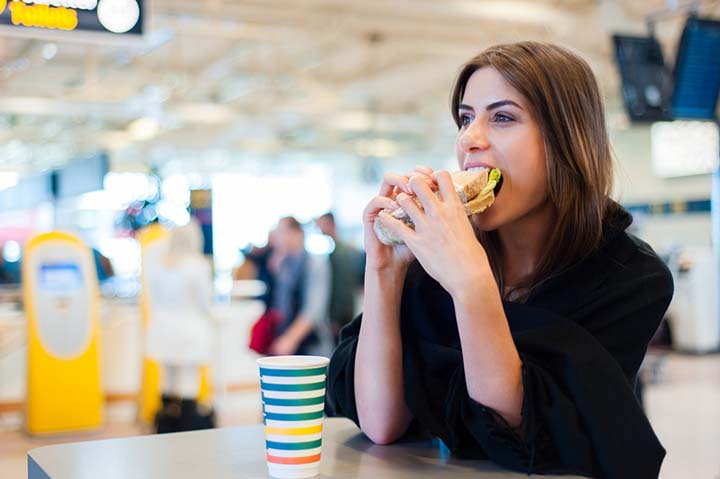Strategy July 05, 2022
7 Best Practices for Healthy Eating on the Road
When you’re busy on business trips with work-related tasks and socializing, food consciousness often takes a backseat. Here’s how to be more intentional about what you’re consuming.
Business trips can be grueling, especially these days with the many delays and snarls at airports across the U.S.
But flying is just the beginning. After the time it takes to get to the destination (when stress can make anyone want to reach for an airport burger and beer), there are long hours at the conference or show, networking events, meals with clients and colleagues, afterparties at the bar, and the list goes on – all of which combine to make healthy, intentional food and drink intake more difficult.

Unfortunately, Americans in particular are already primed to reach for convenient, quick eats, which are often unhealthy. According to the Centers for Disease Control and Prevention, nearly 85 million people in the U.S. eat fast food every day during their normal life routines. And when your personal schedule and habits are thrown off by travel and the socializing that goes along with it, it’s even more difficult to make healthy eating choices. Here’s how to be more mindful about consumption while you’re on the road.
1. Bring your own snacks. Before setting off on your trip, head to the grocery store for healthy snacks and ingredients to make your own. Dried fruit, lower-sodium beef jerky, and make-your-own trail mix and protein balls travel easily and can be accessed quickly while you’re waiting at the airport, sitting on a flight or relaxing in your hotel room between meetings. It’s cheaper – and often healthier – than grabbing whatever food happens to be available offer when you arrive.
2. Limit alcohol, coffee and sugary drinks. While alcohol tends to be prevalent on work trips, recognize that drinking it late in the day can disrupt sleep (which also impacts healthy food decisions – see #7). Have a plan for how much you’ll drink, and give yourself a cutoff time. Coffee is a nice “treat yourself” pick-me-up, but it too can disrupt sleep and can be chock-full of calories. Drinks like juice and soda can also make sound sleep more difficult, not to mention delivering too much sugar.
3. Pack enough water. It’s easy to lose track of your water intake and become dehydrated during long days, which saps your energy and causes headaches. Pack lightweight drinkware – or buy a recyclable style there and recycle at the end of the event – that fits easily into your show bag, and keep it filled. It’ll help you stay hydrated, avoid the waste of multiple water bottles and keep you from turning to sugary drinks and coffee when you’re looking to quench your thirst.
Nearly
85 million
people in the U.S. eat fast food every day. (CDC)
4. Visit restaurants sparingly. While it’s tempting to stop at an eatery for every meal, you’ll quickly find yourself overeating, often on calorie-rich foods. If you know you have a client or colleague dinner on a given night, eat more lightly for breakfast and lunch that day. Find leafy greens, healthy fruits and lean proteins, and when you’re at the restaurant, look for similar options on the menu. Bonus: If you order a salad, ask for the dressing on the side so you can control your calorie intake.
5. Use room amenities. If your room has a microwave and/or a mini-fridge, use them to your advantage. Consider going to a local grocery store and buying some frozen vegetables and chicken to make an easy meal. You can also grab some fresh fruit and veggies for snacks. Check your room features before you arrive, and see if they’ll add a microwave and fridge if your room doesn’t have one. Also, use the in-room coffee pot instead of ordering a calorie-rich gourmet drink.
6. Be careful with breakfast. Yes, it’s convenient and often included, but breakfast in the hotel lobby is usually full of calorie-rich and sugary baked goods, like muffins, bagels, croissants and make-your-own waffles. But don’t skip breakfast either – make the most of it by choosing proteins like scrambled eggs and bacon, or mix granola and dried fruit for a healthy cereal option. You can also snag a yogurt; just make sure to check the sugar content and opt for plain with a touch of honey added.
7. Get enough sleep. Yes, there’s a direct link between lack of sleep and overeating. Gherlin, a hormone that stimulates appetite, surges when you haven’t had enough sleep, while levels of leptin, which lowers appetite, fall. And while more sleep makes healthier eating easier, it’s often challenging to get a good night’s shuteye while you’re on the road. Recreate as much of your normal sleep routine as possible, avoid alcohol, coffee and sugar near bedtime, and make sure the room is dark and cool.
